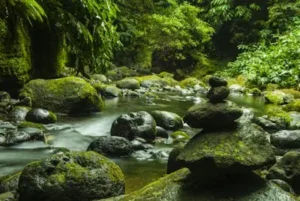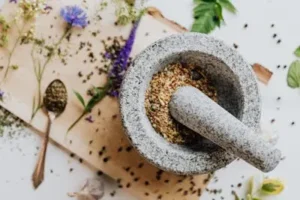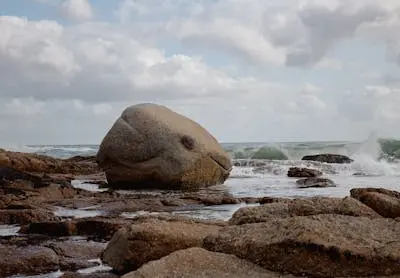Natural Stone Cleaner
Natural stone cleaner surfaces lend timeless charm and grace to any home, but the key is in giving them their well-deserved care. Whether you have breath-taking marble countertops, a resilient granite floor or one-of-a-kind slate tiles knowing how to clean and maintain them is crucial. In our in-depth guide, we will cover all that you need to learn about natural stone cleaners types, DIY alternatives, cleaning methods for the best outcomes preventative care tips and some FAQs
Natural Stone Knowledge
A natural stone comes from a long geological process that cuts over thousands of years with a particular personality and aspect to each one. Here are a few types of natural stone commonly used in homes:
- Marble
Popular for its luxurious look, marble is commonly found on countertops, flooring and decorative details within a home. Slate is less dense and may scratch and etch easier (for example from acidic substances).
- Granite
This is a hard and massive stone used kitchen top surfaces because it withstand to heat as well running resistance. Granite is popular in modern as well as traditional design due to the wide rage of colours and patterns which can be achieved.
- Slate
Tile that has a natural look and texture, making it great to use for flooring or roofing. This flooring is durable, but it can absorb moisture so sealant application to the top layer is important.
- Limestone
Another form of sedimentary rock, available in multiple colours and used mainly for outdoor flooring. Marble: Marble is a softer and more porous material making it lighter (and therefore easier to scratch) and prone to stains compared to granite.
- Travertine
A bit of a misnomer, travertine is actually a form of limestone [but] more accurately refers to the sedimentation of hot spring and/or river water mineral deposits which neatly forms this gorgeous stone. However, the rustic appeal is so attractive, and hence it often finds its place on patio space as well as other outdoor spaces.
All rocks have a specific range of characteristics that affect how they can be cleaned and maintained.
When To Use Natural Stone Cleaner

It is important that you always use a cleaner recommended for natural stone, because
- pH Balance
Natural stone cleaning products are usually ph balanced to avoid marring and burned areas on your granite. Natural stone cleaners are balanced by pH, which means they won’t do any harm and will instead retain the finish.
- Non-Toxic Ingredients
Most of these cleaners are made with only biodegradable, natural ingredients that will not harm your stone or the environment. They clean efficiently minus the strong chemicals that can damage your surfaces.
- Stain Removal
These can also help deal with stain removal without causing harm to the stone. They break down the dirt and mess but are also gentle enough to prevent scratching.
- Protective Qualities
Some stones cleaners also have protective qualities and will include ingredients that help seal the stone to provide a shield from future stains.
Natural Stone Cleaners
Natural stone cleaners come in a variety of types, each designed for different cleaning needs
- pH-Neutral Cleaners
They work best as a general clean and maintainer. They can clean your stone efficiently without damaging the finish of it.
- Stain Removers
Specialized stain removers tackle oil, wine or coffee stains. They usually have enzymes or other chemicals that are capable of degrading the stain compounds without harming your stone.
- Sealers
While not technically cleaners, these are key products that you may need to protect your stone surfaces from moisture and stains. They form a barrier thus stopping liquids from sticking to it, making the stains more difficult for dirt to be absorbed.
- Pro
Available in a Daily Cleaning Spray, which is ideal for fast cleanups and can used on daily basis to keep your surfaces looking new.
Granite and Marble Polishes
These will enhance the shine of polished surfaces, make them look new again by providing a bit of protection as well.
DIY Natural Stone Cleaners

Here are some great DIY natural stone cleaners to give a try if you would like approach it from the homemade side. Below are few but popular ones:
Vinegar and Water
Even vinegar is acidic, but it does not work well with the more sensitive natural stones like marble- For most of your countertop questions use water only To use it as a cleaner, mix one part vinegar with two parts water (use even less and test on a small patch of leather first just to be safe).
Baking Soda Paste
Create a baking soda paste with water to scrub away rock hard stains. Leave it on the spot for 10-15 minutes before scrubbing with a sponge and wash clean water actions.
Castile Soap Solution
A base vegetable soap that is suitable for everyday use Simply – dilute some Castile soap with warm water and wipe surfaces down with a soft cloth.
Essential Oil Cleaners
Just a few drops of essential oils here, to not only make the cleaner smell good but to also provide some antibacterial properties.
Cornstarch
Apply corn starch on the oil stain, wait a few hours before removing. This way oil gets soaked before getting stuck.
How to Clean Natural Stone
Natural stone is easy to clean however a little care should be taken while cleaning so that the surface doesnt get damaged. So, here is your step-by-step guidelines for cleaning the natural stones:
- Vacuum & Sweep
Dust and debris needs to be cleared off with a soft broom or microfiber cloth. By following this step, not only you have greater leverage on the cleaning process but also prevent scratching.
- Image
Choose Your Cleaner During installation of your natural stone you may have been instructed to seal the some stones or all depending on origination
Spray or apply the cleaner
You can either spray it right onto surface, or have a damp cloth and moisten directly, Do not soak the stone, as too much water can seep into porous surfaces.
Use a gentle wiping motion
Wipe the surface with something soft, such as a cloth or sponge (avoid any abrasive materials that could scratch the stone).
- Rinse Throughly
Clean the surface well in a meticulous manner than you clean rinse with water completely. This is key step to avoid streaks and matte finishes.
- Dry It Off
Wipe down the surface with a soft towel to make sure everything dried out completely. This helps in avoiding water spots and streaks particularly on young polished stones.
- Maintenance
Apply granite or marble polish for a shine and protection boost. Follow the guide on it for maximum results.
- Preventative Care Tips
Preventative Care for Natural Stone To ensure that the beauty, functionality and aesthetic of your natural stone last a lifetime it is always important to put in place some preventative measures.
- Consider Coasters and Mats
Be sure to put coasters under drinking glasses, or mats beneath hot dishes preventing stains from forming on glassware while also helping prevent any heat damage. Taking this one simple step can help your stone surfaces last longer.
- Avoid Harsh Chemicals
Bleach and Ammonia can strip the sealant from your stone Be sure to always read the product labels and use, stones safe products that are gentle.
- Prompt Cleanup
If spills occur, mop them up quickly. Instead of wiping the spill, blot it with a soft cloth. Anything you can do use it will take care of any lingering stained areas with a stone cleaner.
- Do Regular Dusting
Add this to the regular cleaning work too, It may seem an inane detail but it helps reduce the formation of dirt that will later score your writs.
General Regarding Natural Stone Cleaners FAQs
Should I use common household cleaners on natural stone?
You cannot clean soapstone with most household cleaners, because they will damage the stone. In general, choose pH-neutral or natural stone formulated cleaners to prevent etching and dulling.
How frequently do I have to clean my natural stone surfaces?
Once a week is ideal, especially for high-traffic areas like kitchens and bathrooms. For areas not often entered a monthly cleaning would be enough to maintain an adequate appearance.
So you spilled something on the stone… What now?
Dab the spill with a soft cloth immediately do not rub, because this will spread out the spots. Spot-treat any leftover staining the stone cleaner, and then thoroughly rinse down and dry.
Do I need to seal my natural stone?
Yes, your natural stone will have to be sealed in order for it not get stains from moisture. It builds up a barrier to prevent liquids from being able to penetrate, making it more difficult for stains. Seals should be reapplied as often as every 1-3 years for high use areas.
How can I create a home made all natural stone cleaner?
Absolutely! Use watered down vinegar (on stone) or a baking soda paste if it is really bad. Make sure to test an inconspicuous spot before applying it widely and check that the product does not damage your stone.
How can I tell if my stone is scratched or etched?
However, should your marble countertop pick up a few small scratches, try rubbing over these with stone polish. However, if the stone is scratched up pretty bad or etched then refinishing may be required in order to restore that appearance.
Do you have any favorite products?
Also pay attention for brands that state they are safe to use on your kind of stone. Stone Tech, Simple Green and Zep are among the favorite tile cleaning products chosen by most homeowners due to their efficiency, as well as safety.
Conclusion
It is not difficult to keep the beauty of your natural stone surfaces. Maintain the quality and beauty of your stone by using an appropriate natural stone cleaner, cleaning it correctly as well as protecting it from any future damage. Enjoy the beauty of natural stone in your home, and be assured that you are maintaining it properly.
So with the correct know-how and products you can ensure that your natural stone surfaces are a permanently beautiful and aesthetically pleasing aspect of any home. If you want to know more about us than click here:
Difference table of the Content
| Aspect | Details |
|---|---|
| Natural Stone Types | Marble: Luxurious, scratches easily. Granite: Durable, heat-resistant, many colors. Slate: Natural texture, moisture-absorbing. Limestone: Porous, susceptible to stains. Travertine: Rustic look, from mineral deposits. |
| Recommended Cleaners | Use pH-neutral cleaners for all types. Avoid vinegar on sensitive stones (like marble). Sealers protect against stains; apply every 1-3 years for high-use areas. |
| DIY Cleaners | Vinegar & Water: (1:2 ratio) Use sparingly on non-sensitive stones. Baking Soda Paste: Mix with water for tough stains. Castile Soap: Safe for daily use. Essential Oil Cleaners: Add oils for scent and antibacterial properties. Cornstarch: Absorbs oil stains. |
| Cleaning Steps | 1. Vacuum & Sweep: Remove dust with a soft broom. 2. Choose Cleaner: Ensure suitability for your stone. 3. Spray/Apply: Use a damp cloth; avoid soaking. 4. Gentle Wiping: Use soft cloth or sponge. 5. Rinse Thoroughly: Remove cleaner residue. 6. Dry: Wipe with a soft towel. 7. Polish: Add polish for shine if needed. |
| Preventative Care | Use coasters under drinks, mats for hot dishes. Avoid harsh chemicals (bleach/ammonia). Clean spills promptly by blotting, not rubbing. Regular dusting to reduce dirt accumulation. |

1 thought on “The Complete Guide To Natural Stone Cleaner ”